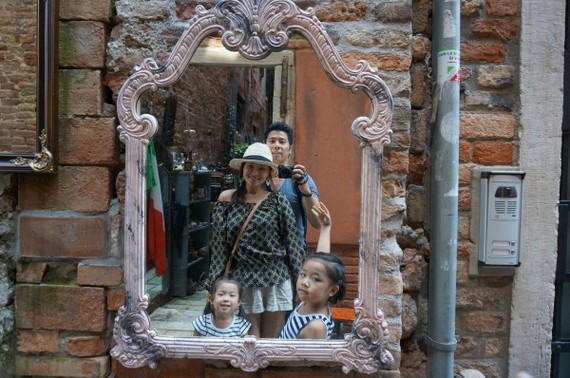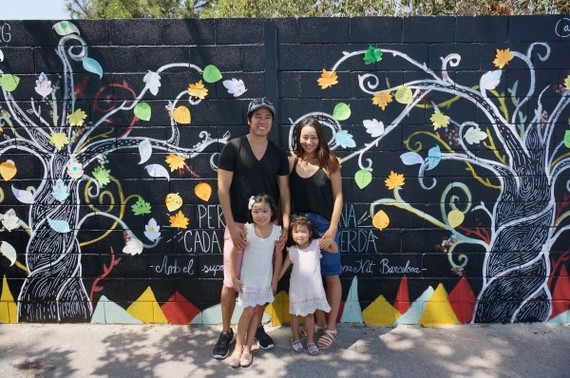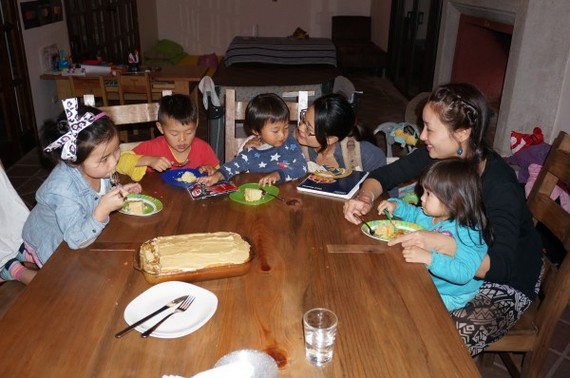Walking back to our B&B on a dark night on the quiet streets of San Juan del Sur, Nicaragua, we spotted something we hadn't seen in over two weeks in the country: another Asian family with young children. It was as if we were seeing aliens from another planet, something we never expected to see in the middle of this sleepy beach town: people like us, a young family with two small children, Asian, and from America.
A few days later, we serendipitously bumped into them at the town's only open market. They were from New York. We were from California. We immediately hit it off. We became friends and kindred spirits, quietly supporting each other during our extended stays in Nicaragua with all of our kids under the age of four.
Call it beginner's luck, as we were able to meet another traveling Asian-American family on our first family trip outside of the United States. Since then, however, through over three years and eighteen countries on four continents of traveling with our kids, we have rarely met other traveling Asian-American families abroad.
Why aren't Asian-American families traveling abroad more?
I've repeatedly pondered this question over the years of barely ever seeing anyone like us on the road. From my personal experience and discussions with other Asian-American families, I believe the limiting factors discouraging family travel abroad are the perception of too many opportunity costs, parents' focus on kids' schooling, and fear of the unknown.
Too Many Opportunity Costs
For most Americans, it's convenient, easy, and relatively affordable to take short U.S. domestic trips as compared to taking the entire family abroad for a vacation. America has everything under the sun, including beaches, resorts, theme parks, mountains, lakes, deserts, and Las Vegas. There's no practical reason to leave the country, deal with language differences, different cultures, and anything foreign. Passport statistics lend weight to this theory, as about 46% of Americans had a valid passport in January 2014, as compared to about 75% of UK citizens.
Regardless of ethnicity, there are inherent opportunity costs--money, time, and energy--of traveling abroad with kids. When resources are scarce, most American families choose to take the easier, more convenient path for their family vacations. Here are some examples of what this thought process might look like when choosing between traveling abroad and domestically within the United States.
- Money: Why spend approximately $4,000 on international roundtrip airplane tickets for a family of four to Bangkok and the beaches of Thailand when you could spend half that amount on roundtrip tickets to Hawaii or Florida, rent a car, and have a safe, family-friendly vacation for a week or two?
- Time: Why travel all the way across the world to Paris, deal with jet lag and long flights, and allocate three weeks for a vacation, when you can pack the kids in the car and drive to Southern California, get a three-day pass to the theme parks your kids want to go to, and get back in time for school and work within a week?
- Energy: Why expend so much energy researching, planning, and even imagining how to travel within South America to see the glaciers, mountains, and the beautiful natural scenery of the continent, when you can drive to a nearby national park without as much planning and stress?
Asian-Americans share this American sentiment of making life as comfortable and convenient as possible. For some Asian first and second-generation families, making an annual trip to their native countries in Asia to visit relatives during the kids' school breaks is still done. But for most Asian-American families, family travel outside of the United States just doesn't make any practical sense from an opportunity cost perspective.
Focus on Kids' Schooling
Focusing on kids' schooling to gain advantages in an increasingly competitive society and workforce is the primary priority for most Asian-American parents. Kids need to be in school as much as possible, excel in their studies, get good grades, participate in sports, dance and music practices, and attend summer camps and summer school. This focus starts during preschool and carries on through grade school, high school, and college. International family travel isn't part of the education equation; travel is perceived as an unnecessary distraction and not conducive to excelling in school. Missing a few days of school for travel is looked down upon. Taking kids out of school for a semester or two would be unthinkable.
From a cost-benefit analysis, most Asian-Americans view investment in their kids' studies--whether it be after-school tutoring, piano lessons, or Mandarin immersion classes--as better than travel to another country. Money spent on travel is viewed as frivolous and unnecessary. Why pay for an expensive family vacation, when that disposable income could be saved for private school education or college funds?
Another big part of investing in kids' educations is ensuring they live in a nice home in a safe neighborhood. Asian-American parents would rather buy an expensive and almost unaffordable house in a good school district in order for their kids to have an upper hand in their education. Most Asian-American families prefer to buy homes, put roots down, and invest in their family's biggest assets--a home and kids--than to travel. Because Asian-American families are so financially and emotionally connected to their homes, travel away from the home becomes increasingly difficult as the kids grow older.
To afford these priorities, Asian-American parents will work long hours at the office, and take little, if any, time off. Giving their kids a better life than they had as children is worth the lifelong sacrifice of time, energy, and money. Travel, for most Asian-American parents, doesn't provide as much value as having kids in school and learning skills they can use as functional, productive adults.
Fear of the Unknown
The fear factor for traveling can be multi-faceted for Asian-American families. Regardless of ethnicity, American parents have a fear of the unknown, especially with regard to their kids' safety, whether it be from illness, injury, or crime in foreign countries; no parents want their kids to be put into unnecessary harm. Traveling to developing countries and anywhere off the beaten track just isn't worth the risk.
The fear of not being physically comfortable while traveling abroad makes it difficult to convince most Asian-American families that a few weeks in Guatemala, for example, would be enjoyable when almost every meal would consist of corn or flour tortillas and black beans. It doesn't make any sense to put oneself through that kind of self-deprivation. Thus, travel that has perceived high levels of discomfort and difficulty isn't given much consideration, especially when kids are below the age of ten.
For most Asian-American families, there are other fears that come into play when deciding whether or not to travel abroad. A risky trip to Africa or South America instead of the typical family cruise vacations to Alaska or getaways to Las Vegas exposes one to the risk of losing face in the workplace or the community. It's easier to go back to work and talk about an all-inclusive stay at a resort on Maui than it is to share news of one week of travel around the island nation of Trinidad.
Most Asian-American parents--similar to other parents in America of different ethnicities--desire stability, security, and predictability in their family lives. Bringing kids into a foreign country where they don't know anyone, don't speak the local language, and don't know how to get around threatens that sense of well-cultivated family security. As a result, fear kills the dream of family travel abroad before it can ever become a reality.
_________________________
When we traveled to Antigua, Guatemala, for four weeks with our daughters, then ages 4 and 2, we were happy to know that our Asian-American friends, whom we had met in Nicaragua over a year before, were living and working there too. Since we last met them, they had settled down in Central America, making the small colonial town of Antigua their home. For four weeks, we spent time with them and even sent our kids to the same bilingual international preschool our friends' boys attended. Because they lived there, we expected to see other Asian-American families traveling and living there as well. On the contrary, for our entire four weeks in Antigua, they were the only other Asian-American family that we would ever see in Guatemala.
In a perfect world, I would love to see more Asian-American families, especially with young kids below the age of ten, traveling to more places in the world that are not frequently visited by tourists. They would be traveling longer, slower, and to destinations that are not just geared for family entertainment and vacations, such as Las Vegas or Disneyland. Asian-American parents would see the benefits of traveling abroad with their kids, early and often, as an integral part of their kids' growth and development. Travel would become their lifestyle and an essential way of learning about themselves and the world they live in.
But we don't live in a perfect world. The reality is that travel takes a backseat to getting good grades, excelling in school activities, and taking steps to get into a good college, all on the path to getting a respectable job and starting a family. For the majority of Asian-American parents, family travel doesn't serve a purpose within that reality; family travel to foreign countries is viewed as expensive, wasteful, and unproductive.
When I decided to pull my kids out of school to take a gap year of travel around the world, some of my own relatives' reactions weren't very encouraging. I was called "irresponsible, selfish, and too idealistic" by some of my closest family members. Why give up a steady job, take the kids out of school, and spend money on a vague plan to travel the world for a year? It just didn't make sense. Why couldn't I be a normal parent who worked full-time, sent his kids to school, and stuck with two-week vacations once or twice a year?
In response to all the doubts and fears, my answer to them was simply...WHY NOT?! By actually going out into the world and traveling with my family, I discovered the real value of family travel and realized that the benefits far outweighed the perceived risks. Family travel was the best thing we could do to enhance our kids' educations, differentiate them from kids at home, and help build stronger family bonds. So we went on our trip around the world, had a great time on our gap year, and are much better for it.
Now that we're back at home, the kids are in school, and life is back to normal. But we're just getting started on seeing the rest of the world, and hopefully we'll start seeing more Asian-American families out there with us.
Originally appeared on LiveFamilyTravel.com. Images courtesy of author.
Cliff Hsia is a father who is determined to live a better than normal life by traveling the world, slowly and purposefully, with his wife and two young daughters. He writes about travel, family, love, happiness, faith, and everything else that life throws at him.
Read Cliff's articles at Live Family Travel and connect with him on Facebook and Twitter.




